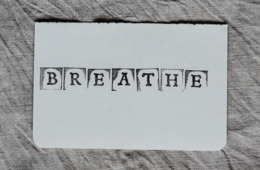
Your Brain’s Cleaning Crew
Imagine your brain as a computer running too many apps at once. Every worry, task, or random thought is another program using energy in the background. Journaling is how you close those extra windows.
When thoughts stay in your head, they blur together into shapeless stress. But when you write them down, they turn into something you can see and manage. The page acts as a container, freeing up space in your mind. Suddenly, problems feel smaller and solutions easier to spot.
This process also gives your working memory a break. Instead of juggling every thought at once, your brain can relax and focus on what actually matters.
Slow Writing, Fast Clarity
In a world that moves at lightning speed, writing by hand forces you to slow down. Your brain may race ahead, but your pen insists on moving one word at a time. That slow rhythm is the secret.
As you write, your thoughts begin to line up instead of crashing into each other. You start sorting what’s important from what’s just background noise. The simple act of turning ideas into sentences activates the part of your brain responsible for logic and planning. What felt confusing in your head often looks surprisingly simple once it’s on the page.
Writing gives chaos a structure. And once your thoughts are organized, you can finally breathe again.
Spotting Patterns and Finding Meaning
Keep a journal for a few weeks, and you’ll start noticing something powerful. The entries become a map of your moods, habits, and triggers.
You might see that Mondays always feel stressful or that your energy spikes after a walk. Maybe you realize certain people leave you drained or that you feel better when you skip late-night scrolling. These insights aren’t random, they’re patterns. When you spot them, you gain the power to change them. A journal is more than a record of days; it’s a mirror that helps you understand your own behavior and design a life that feels better.
Releasing Emotional Weight
Beyond just to-do lists and decisions, journaling is essential for processing strong emotions like anger, frustration, or sadness. When you experience something upsetting, those feelings stay trapped, often manifesting as tension, lack of sleep, or poor concentration. Writing is a release valve.
Instead of keeping that difficult conversation or disappointment locked inside, write it all out in detail. Describe the event, the people involved, and exactly how it made you feel. The paper can hold the full force of your emotion without judgment. Once the feelings are externalized and acknowledged, they lose much of their power over you, helping you regain emotional balance and mental space. You are no longer trying to manage a surging emotion while also trying to work or relax.
Practical Ways to Use Journaling for Focus
You don’t need to be a writer or have fancy notebooks and pens, (though they are fun and if they bring you joy, there is no shame in that.) The point isn’t perfection. It’s about creating a moment of honesty and mental order.
The Morning Brain Dump
Before you touch your phone, grab a pen and paper. Spend five or ten minutes unloading everything that’s in your head, all your worries, errands, ideas, dreams, anything. Get it all out. When your brain knows a thought has been written down, it stops repeating it like a broken record. That release clears mental space so you can start your day with a clean slate.
Using the Page for Big Decisions
When faced with a tough choice, writing helps you think clearly. At the top of the page, write the question you’re wrestling with. Then make two lists: pros and cons. As you write, be honest about what’s really holding you back. Fear often hides behind logic. Seeing your thoughts in front of you helps you separate what’s true from what’s emotional noise. Decisions that once felt impossible start to make sense.
The Gratitude List
A short daily gratitude list can shift your entire mindset. Write down three things you appreciate. They don’t have to be profound; sunlight, your morning coffee, a talk with a friend, or a good laugh all count. Focusing on what’s going well trains your brain to look for more of it. Over time, this reduces stress and makes it easier to see the positives in daily life.
How to Make the Habit Stick
The secret to successful journaling isn’t depth or length, it’s consistency. Here’s how to make it effortless:
Keep it short. Promise yourself five minutes. That’s all it takes to feel the benefits.
Attach it to a routine. Write during your morning coffee or before bed. Linking it to something you already do helps it become automatic.
Forget perfection. No one else will ever read your journal, so stop editing your thoughts. Messy handwriting and incomplete sentences are proof you’re doing it right.
Pick your time. Mornings are great for clearing your head. Evenings are perfect for reflection. Try both and see which one leaves you feeling calm and focused.
The goal isn’t to write beautifully or correctly, it’s to think clearly.
Why It Works
Journaling doesn’t just feel good; it changes how your brain functions. Neuroscientists have found that labeling emotions and writing them down reduces activity in the parts of the brain linked to stress. It also strengthens the connection between logic and emotion, helping you process feelings without getting lost in them.
Writing turns overwhelm into understanding. It’s not therapy, but it’s close.
Journaling Won’t Replace Therapy, but it Helps
Journaling is a powerful supplementary tool, but it is not a replacement for professional help or genuine human connection. It is excellent for processing thoughts privately, but it cannot offer external feedback, validation, or the strategic guidance that a therapist or trusted friend can provide. Use it to prepare for those conversations, not to avoid them.
FAQ
1. What if I have no idea what to write?
Start with one sentence. Try “Today I feel…” or “What’s bothering me right now is…” Once your pen moves, your thoughts will follow.
2. Is typing okay, or should I use a notebook?
Handwriting is best for clarity because it slows your thoughts and encourages reflection. Typing is fine if you’re in a hurry, but it often feels more mechanical.
3. How soon will I notice a difference?
You’ll feel lighter almost immediately. Most people notice real clarity and focus after two to three weeks of regular journaling. And as with most things, the longer you do it, the better results you get.
4. Can this really help with stress?
Yes. Writing releases mental tension by getting thoughts out of your head. Once they’re on paper, they lose their power to loop endlessly in your mind.
5. What if I skip a few days?
No problem. Pick it back up whenever you can. The habit works best with consistency, but it doesn’t need to be perfect.
Does your brain ever feel like a room full of buzzing flies? You try to focus on one task, but your thoughts scatter everywhere. Decision-making feels impossible, and even small choices feel heavy. If this sounds familiar, you’re not broken, your mind is just overloaded.
There’s an easy and free way to find clarity again: journaling.
For centuries, people have written to make sense of life and their problems. From explorers recording their journeys to artists sorting through emotions, writing things down has always helped humans process their world. Today, experts recognize journaling as one of the simplest and most effective tools for focus, creativity, and emotional balance. A few minutes of honest writing can lift mental fog, create calm, and give you a sharper view of your life.
Your Brain’s Cleaning Crew
Imagine your brain as a computer running too many apps at once. Every worry, task, or random thought is another program using energy in the background. Journaling is how you close those extra windows.
When thoughts stay in your head, they blur together into shapeless stress. But when you write them down, they turn into something you can see and manage. The page acts as a container, freeing up space in your mind. Suddenly, problems feel smaller and solutions easier to spot.
This process also gives your working memory a break. Instead of juggling every thought at once, your brain can relax and focus on what actually matters.
Slow Writing, Fast Clarity
In a world that moves at lightning speed, writing by hand forces you to slow down. Your brain may race ahead, but your pen insists on moving one word at a time. That slow rhythm is the secret.
As you write, your thoughts begin to line up instead of crashing into each other. You start sorting what’s important from what’s just background noise. The simple act of turning ideas into sentences activates the part of your brain responsible for logic and planning. What felt confusing in your head often looks surprisingly simple once it’s on the page.
Writing gives chaos a structure. And once your thoughts are organized, you can finally breathe again.
Spotting Patterns and Finding Meaning
Keep a journal for a few weeks, and you’ll start noticing something powerful. The entries become a map of your moods, habits, and triggers.
You might see that Mondays always feel stressful or that your energy spikes after a walk. Maybe you realize certain people leave you drained or that you feel better when you skip late-night scrolling. These insights aren’t random, they’re patterns. When you spot them, you gain the power to change them. A journal is more than a record of days; it’s a mirror that helps you understand your own behavior and design a life that feels better.
Releasing Emotional Weight
Beyond just to-do lists and decisions, journaling is essential for processing strong emotions like anger, frustration, or sadness. When you experience something upsetting, those feelings stay trapped, often manifesting as tension, lack of sleep, or poor concentration. Writing is a release valve.
Instead of keeping that difficult conversation or disappointment locked inside, write it all out in detail. Describe the event, the people involved, and exactly how it made you feel. The paper can hold the full force of your emotion without judgment. Once the feelings are externalized and acknowledged, they lose much of their power over you, helping you regain emotional balance and mental space. You are no longer trying to manage a surging emotion while also trying to work or relax.
Practical Ways to Use Journaling for Focus
You don’t need to be a writer or have fancy notebooks and pens, (though they are fun and if they bring you joy, there is no shame in that.) The point isn’t perfection. It’s about creating a moment of honesty and mental order.
The Morning Brain Dump
Before you touch your phone, grab a pen and paper. Spend five or ten minutes unloading everything that’s in your head, all your worries, errands, ideas, dreams, anything. Get it all out. When your brain knows a thought has been written down, it stops repeating it like a broken record. That release clears mental space so you can start your day with a clean slate.
Using the Page for Big Decisions
When faced with a tough choice, writing helps you think clearly. At the top of the page, write the question you’re wrestling with. Then make two lists: pros and cons. As you write, be honest about what’s really holding you back. Fear often hides behind logic. Seeing your thoughts in front of you helps you separate what’s true from what’s emotional noise. Decisions that once felt impossible start to make sense.
The Gratitude List
A short daily gratitude list can shift your entire mindset. Write down three things you appreciate. They don’t have to be profound; sunlight, your morning coffee, a talk with a friend, or a good laugh all count. Focusing on what’s going well trains your brain to look for more of it. Over time, this reduces stress and makes it easier to see the positives in daily life.
How to Make the Habit Stick
The secret to successful journaling isn’t depth or length, it’s consistency. Here’s how to make it effortless:
Keep it short. Promise yourself five minutes. That’s all it takes to feel the benefits.
Attach it to a routine. Write during your morning coffee or before bed. Linking it to something you already do helps it become automatic.
Forget perfection. No one else will ever read your journal, so stop editing your thoughts. Messy handwriting and incomplete sentences are proof you’re doing it right.
Pick your time. Mornings are great for clearing your head. Evenings are perfect for reflection. Try both and see which one leaves you feeling calm and focused.
The goal isn’t to write beautifully or correctly, it’s to think clearly.
Why It Works
Journaling doesn’t just feel good; it changes how your brain functions. Neuroscientists have found that labeling emotions and writing them down reduces activity in the parts of the brain linked to stress. It also strengthens the connection between logic and emotion, helping you process feelings without getting lost in them.
Writing turns overwhelm into understanding. It’s not therapy, but it’s close.
Journaling Won’t Replace Therapy, but it Helps
Journaling is a powerful supplementary tool, but it is not a replacement for professional help or genuine human connection. It is excellent for processing thoughts privately, but it cannot offer external feedback, validation, or the strategic guidance that a therapist or trusted friend can provide. Use it to prepare for those conversations, not to avoid them.
FAQ
1. What if I have no idea what to write?
Start with one sentence. Try “Today I feel…” or “What’s bothering me right now is…” Once your pen moves, your thoughts will follow.
2. Is typing okay, or should I use a notebook?
Handwriting is best for clarity because it slows your thoughts and encourages reflection. Typing is fine if you’re in a hurry, but it often feels more mechanical.
3. How soon will I notice a difference?
You’ll feel lighter almost immediately. Most people notice real clarity and focus after two to three weeks of regular journaling. And as with most things, the longer you do it, the better results you get.
4. Can this really help with stress?
Yes. Writing releases mental tension by getting thoughts out of your head. Once they’re on paper, they lose their power to loop endlessly in your mind.
5. What if I skip a few days?
No problem. Pick it back up whenever you can. The habit works best with consistency, but it doesn’t need to be perfect.

Journaling isn’t about being poetic or disciplined, it’s about creating space in your mind. A notebook, a pen, and a few quiet minutes can turn mental noise into clear thought.
When your brain feels crowded, grab a pen. Empty your head, one sentence at a time. You might be surprised how quickly focus returns once you stop carrying every thought around with you.
Related posts




